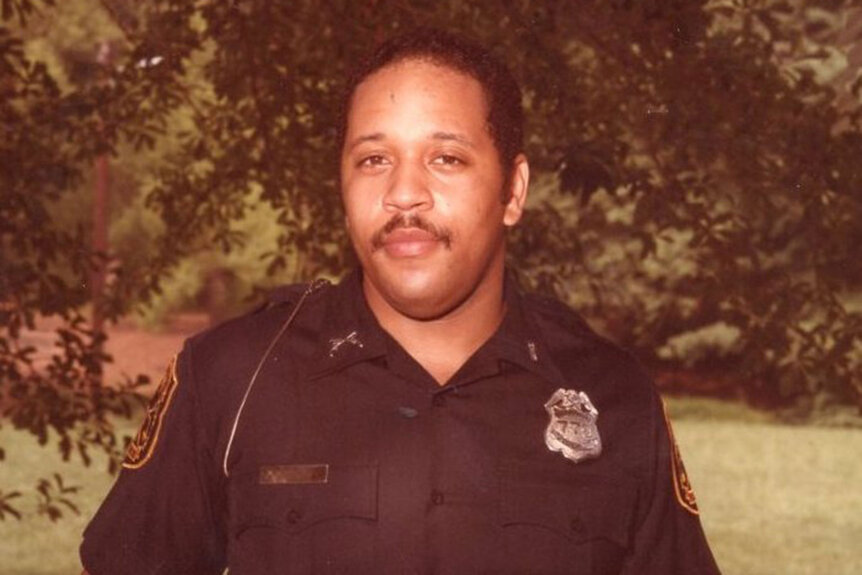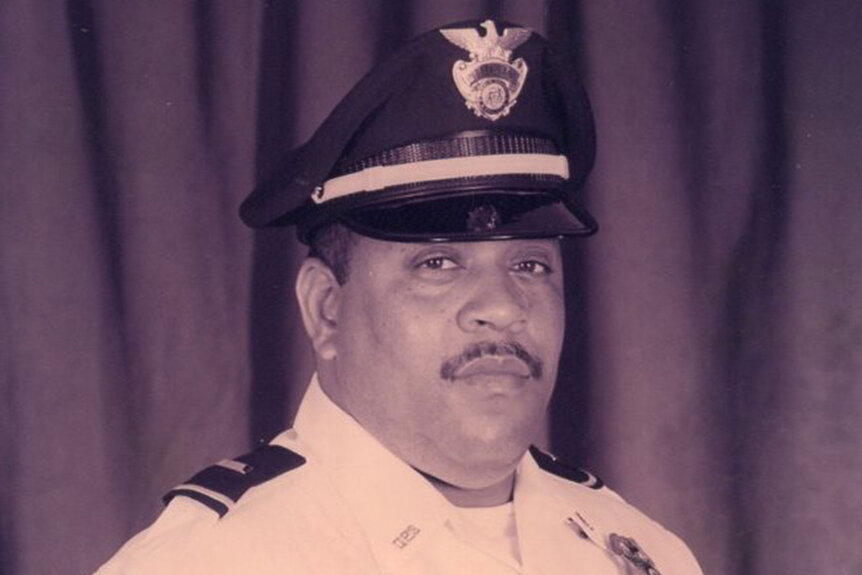Create a free profile to get unlimited access to exclusive videos, breaking news, sweepstakes, and more!
‘Shocked At The Number Of Shell Casings’: Atlanta Sheriff-Elect Gunned Down In Hit Masterminded By Rival
An Atlanta sheriff-elect was shot 11 times outside his home. Detectives are shocked at who ordered the hit.
In November 2000, Atlanta police veteran Derwin Brown reached a new milestone in his distinguished two-plus decade career. In a tight runoff vote, he was elected sheriff of DeKalb County.
“Everyone knew that Mr. Brown was all about being upright and honest,” former TV journalist Shaunya Chavis told “The Real Murders of Atlanta,” airing Fridays at 9/8c on Oxygen.
Then, at 11 p.m. on December 15, just three days before he was to take office, Brown was ambushed and gunned down in his driveway. His wife, Phyllis, who was inside and heard the shots, called 911.
Brown was rushed to the hospital, where he died. At the crime scene, 12 red roses Brown had gotten for Phyllis, were on the ground. There were also more than a dozen red flags that marked where shell casings had fallen.
“I was shocked at the number of shell casings,” said J. Tom Morgan, retired District Attorney for DeKalb County. “It was later found that 11 shots had been fired into Brown’s body. Three of those were fatal.”
Atlanta law enforcement raced to find the killer, forming the largest area task force since the Atlanta Child Murders 20 years prior.
Investigators dug into Brown’s history to determine potential suspects. They considered the fact that he could have made enemies among the many individuals “he’d locked up over the course of his 23-year career,” said Chavis.
The Georgia Bureau of Investigation (GBI) found that every shell casing in evidence had been fired by the same 9mm gun that had been modified to shoot more than a typical six rounds.
Such modifications, investigators said, were typically done by gang members or drug dealers. Brown came into contact with “murderers, rapists, drug dealers and gang members probably on a daily basis,” reasoned Fred Mays, an agent with the GBI.
Had someone he put away or a family member taken revenge? Detectives pursued this line of investigation, but it was a dead end.
As the search for the killer continued, Brown was laid to rest. He was buried in a uniform that he had had custom ordered for his new job. “It had to be put into the ground instead of put into service,” said Morgan.
Investigators turned their focus to Brown’s recent electoral victory against the incumbent, Sheriff Sidney Dorsey, a prominent figure in the city who had been a part of the investigative team that brought Wayne Williams to justice for the Atlanta Child Murders. After retiring from the Atlanta Police Department, Dorsey ran for and was elected DeKalb County Sheriff. He was the first African American elected to the position.
But reports of corruption inside Dorsey’s office had recently emerged. “I began to hear rumors about the way that he was dealing with things,” said Jackie Barrett-Washington, former sheriff of Fulton County, Georgia.
Brown stepped up to run against Dorsey in 2000, promising to clean up corruption in the Sheriff’s Department, a strategy that helped lead him to victory.
“Sidney Dorsey was infuriated that he had lost,” said Chavis. Was he mad enough to commit a murder?
“We interviewed Sheriff Dorsey and it was clear he was at home with his wife when the murder occurred,” said Morgan. Between a solid alibi and no physical evidence to tie him to the murder, Dorsey was cleared.
But investigators learned that Dorsey wasn’t the only one losing his job. Before taking office, Brown had begun the process of cleaning house in the corruption-plagued office. He informed close to three dozen people that his first day as sheriff would be their last.
“He was handing out pink slips,” said Maria Boynton, former news anchor for WYAY radio. “These were people who had a bone to pick.”
Names were one-by-one crossed off the list — save for Patrick Cuffy, who worked for Dorsey. Derwin decided to fire Cuffey after discovering that he was filing fraudulent overtime hours to collect extra pay.
Cuffy told police that at the time of the murder he was with three men discussing plans for when their jobs ended in January. The men were Melvin Walker, a deputy in the sheriff’s office, as well as David Ramsey and Paul Skyers, who worked in the sheriff’s security firm.
Detectives interviewed the three men. All four men corroborated each other’s alibis. Despite their suspicions that the men were involved in the murder, investigators lacked evidence to hold them.
Before detectives could dig deeper, Morgan got a disturbing message from a private defense attorney who’d been one of prosecutors.
“He said, ‘Don’t ask me any questions. But you need to start carrying a firearm … and you need security as much as possible,’” Morgan told producers. “I knew as an attorney that the only way you can break confidentiality is if you believe a client is going to harm another person.”
The whole task force’s radar went up, according to “The Real Murders of Atlanta.” The case stalled for three months. Then Cuffy got involved in a drug case that ended in a murder.
Cuffy was charged with murder and faced life in prison. Detectives used that as leverage to get Cuffy to tell them what he knew about the Brown murder.
Cuffy made a deal with the DEA for immunity, in addition to asking for a lighter charge in the drug case. Then, he dropped a bombshell: He said that Dorsey had masterminded Brown’s assassination.
Cuffy told detectives that Dorsey had summoned him to his house. The scene that played out was like something from a movie. Dorsey wrote instructions to kill Brown on a slip of paper, showed it to him, and then ate the note.
Cuffy told Dorsey that Walker, Ramsey and Skyers could help do the job. Skyers would be the getaway driver, Walker would be the trigger man, and Ramsey and Cuffy would have guns for if needed. The murder went down according to that plan.
Dorsey wanted the job done before Brown took office because he believed there was a chance that the event would force a special election, according to The New York Times.
Cuffy said that Dorsey’s hit list didn’t stop with Brown. It included Morgan, as well as a local reporter and a public safety director. Investigators needed additional witnesses and physical evidence to back up the shocking story.
Skyers agreed to testify if he was given the same deal as Cuffy. He corroborated Cuffy’s statements and led them to the murder weapon.
Almost a year after Brown was assassinated, Dorsey was arrested for his murder. Walker and Ramsey were charged for their roles in the slaying.
Cuffy and Skyers were granted immunity. “Sometimes you have to make those deals to get an indictment,” said GBI agent Mays.
The high-stakes, high-profile trial began in March 2002. Walker and Ramsey were tried first. Cuffy was a key witness, and he had a credibility issue. The jury found both defendants not guilty.
Two and a half years of publicity necessitated moving Dorsey's trial to Albany, Georgia. “Unlike the other trial, we had witnesses that corroborated everything we were saying,” investigators said.
After three days of deliberation, the jury came back with a guilty verdict on the murder count against Dorsey. He was sentenced to life in prison, plus 20 years.
In 2005, a federal jury found Walker and Ramsey guilty of conspiracy when they deprived Brown of his civil rights. They are now serving life in federal prison.
For more on the case, watch “The Real Murders of Atlanta,” airing Fridays at 9/8c on Oxygen.






















